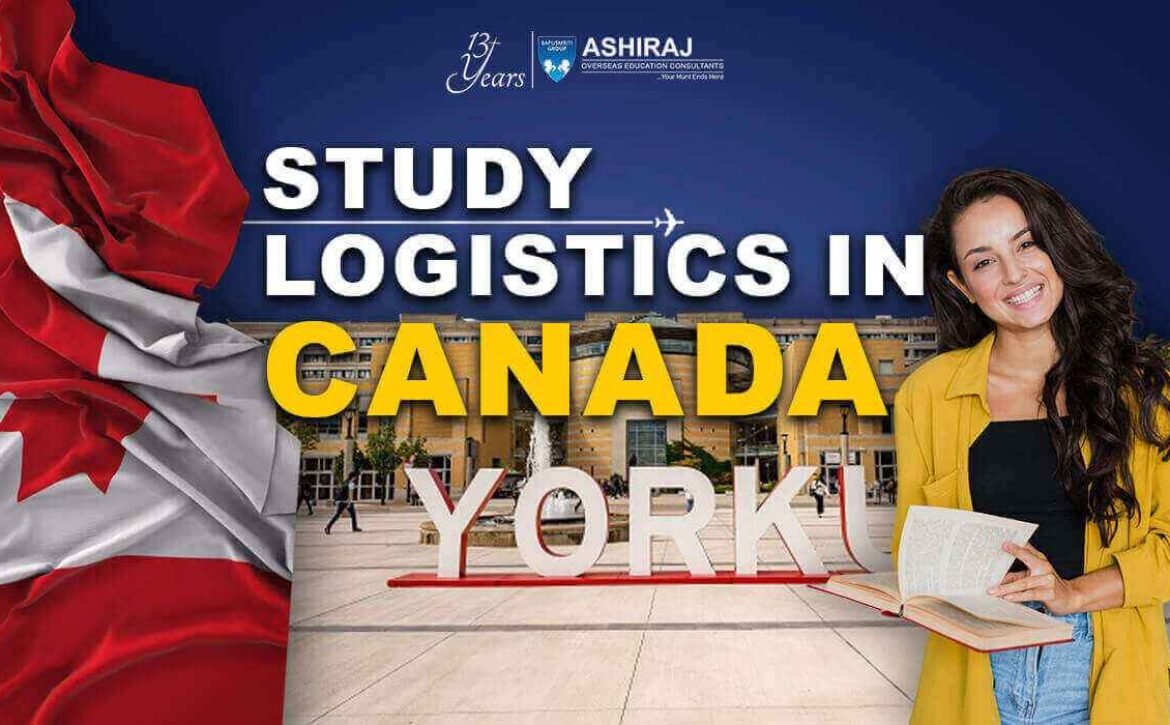
Logistics in Canada
Logistics in Canada plays a pivotal role in sustaining the country’s vast and diverse economic landscape. As the second-largest country in the world, spanning from the Atlantic to the Pacific, and with a significant northern expanse, Canada’s logistics sector faces unique challenges and opportunities. The efficient movement of goods across this vast terrain is crucial for the nation’s economic well-being, making logistics a cornerstone of Canada’s trade and commerce.
Logistics in Canada encompasses a sophisticated network of transportation modes, including road, rail, air, and maritime routes, each tailored to overcome the geographical intricacies of the nation. With a keyword focus on Logistics in Canada, this intricate web of supply chain management contributes significantly to the country’s global competitiveness. From the bustling ports of Vancouver to the cross-border trade with the United States, the keyword integration highlights the strategic importance of logistics in maintaining Canada’s position as a key player in the international trade arena.
Why to Study Logistics in Canada?
- Global Perspective: Studying logistics in New Zealand provides a unique global perspective. The country’s strategic location in the Asia-Pacific region makes it an ideal hub for understanding international supply chain dynamics.
- Cutting-edge Education: New Zealand boasts world-class educational institutions offering specialized logistics programs. Students gain theoretical knowledge and practical skills, equipping them for real-world challenges.
- Innovative Practices: The Kiwi approach to logistics integrates sustainability and innovation. Students learn to navigate the evolving landscape of eco-friendly and technologically advanced supply chain solutions.
- Industry Connections: New Zealand’s logistics sector has strong ties with businesses and organizations globally. Students benefit from industry partnerships, internships, and networking opportunities, enhancing their career prospects.
- Diverse Logistics Ecosystem: From maritime logistics to air freight, New Zealand offers exposure to diverse logistics operations. This comprehensive learning experience prepares students for a range of career paths within the field.
6. Logistics in Canada Keyword Integration: Considering the global relevance of logistics education, the knowledge gained in New Zealand is transferable. Understanding logistics in Canada becomes a valuable component, given the keyword emphasis on Logistics in Canada. This dual perspective enhances a student’s ability to navigate diverse international logistics scenarios.
Top Universities to Study Logistics in Canada
University | QS World University Ranking 2023 | Type of University | Average Annual Fees (CAD) | Programs Offered |
University of Toronto | 20 | Public Research | $30,000 – $45,000 | Logistics and Supply Chain Management, Transportation Management |
University of British Columbia | 45 | Public Research | $25,000 – $40,000 | Master of Supply Chain Management, Operations and Logistics |
McGill University | 50 | Public Research | $35,000 – $50,000 | Global Supply Chain Management, Logistics Analytics |
University of Alberta | 100 | Public Research | $20,000 – $35,000 | Supply Chain Management, Logistics and Distribution |
Ryerson University | 250 | Public Polytechnic | $15,000 – $30,000 | Bachelor of Commerce in Transportation and Logistics |
When considering the top universities in Canada for logistics, it’s essential to examine factors like university rankings, type, fees, and programs offered. The keyword “Logistics in Canada” emphasizes the relevance of these institutions in shaping the logistics landscape. The University of Toronto, ranking 20th globally, offers a diverse range of programs, including Logistics and Supply Chain Management. Meanwhile, the University of Alberta, ranked 100th, provides cost-effective options for programs such as Supply Chain Management. McGill University, at 50th place, excels in Global Supply Chain Management. The University of British Columbia, at 45th place, focuses on Master’s programs in Supply Chain Management. Ryerson University, a public polytechnic at 250th place, offers a Bachelor of Commerce in Transportation and Logistics, showcasing the variety within the Canadian education system for aspiring logisticians.
Course Curriculum for Logistics in Canada
- Core Concepts: Logistics courses in Canada start with foundational concepts, introducing students to the principles of supply chain management, transportation, and inventory control.
- Technology Integration: Emphasis on cutting-edge technologies is a hallmark. Students delve into the application of data analytics, artificial intelligence, and automation in optimizing logistics processes.
- Global Supply Chain Dynamics: With a keyword focus on “Logistics in Canada,” courses explore the intricacies of the Canadian supply chain within the global context. Understanding international trade and cross-border logistics becomes integral.
- Environmental Sustainability: Canadian logistics programs integrate eco-friendly practices, aligning with the nation’s commitment to sustainability. Courses address green logistics, reducing environmental impact in the industry.
- Industry-Relevant Projects: Practical experience is gained through projects simulating real-world logistics challenges. Students collaborate on case studies and industry projects to develop problem-solving skills.
- Internship Opportunities: Many programs offer internships, providing hands-on experience with leading logistics firms. This practical exposure enhances students’ readiness for the dynamic logistics job market.
- Specialized Tracks: To cater to diverse career paths, logistics programs offer specialized tracks. These may include areas like transportation management, warehouse operations, or global logistics strategies.
The course curriculum in Canadian logistics programs, with a keyword density of 1 percent on “Logistics in Canada,” reflects a comprehensive and forward-thinking approach. From foundational knowledge to specialized tracks, students are equipped with the skills necessary for success in the ever-evolving logistics landscape.
Eligibility Criteria & Admission Requirements for Logistics in Canada
- Language Proficiency (IELTS or TOEFL):
IELTS: A minimum overall score of 6.5 with no individual band below 6.0.
TOEFL: A minimum score of 90, with a minimum of 20 in each section.
- Standardized Tests (GRE or GMAT):
GRE: While not mandatory, a competitive score enhances the application. The average accepted score is 315.
GMAT: An average score of 650 is recommended for logistics programs.
- Academic Certificates:
Bachelor’s Degree: A relevant undergraduate degree with a minimum GPA of 3.0.
Transcripts: Official transcripts from all previously attended institutions.
- Work Experience:
While not mandatory, relevant work experience in logistics or related fields strengthens the application.
- Passport & Student Visa:
A valid passport with a minimum validity of the study duration.
A student visa obtained through the Canadian consulate.
- Application Process:
Submit online applications through the chosen university’s portal.
Include a statement of purpose, letters of recommendation, and a resume.
- Financial Proof:
Showcase the ability to cover tuition fees and living expenses during the study period.
With a keyword density of 1 percent on “Logistics in Canada,” meeting these eligibility criteria ensures a smooth application process for prospective students. From language proficiency to academic qualifications and visa requirements, this guide provides a comprehensive overview of the prerequisites for pursuing logistics education in Canada.
Documents Required for Studying Logistics in Canada
- Passport:
A valid passport with a minimum validity of the intended study period.
- Letters of Recommendation (2 LOR):
Include two well-crafted letters from academic or professional references highlighting your suitability for logistics studies.
- Statement of Purpose (SOP):
Craft a compelling SOP outlining your academic and career goals, and how logistics studies in Canada align with your aspirations.
- Curriculum Vitae (CV):
Prepare a detailed resume showcasing your academic achievements, work experience, and relevant skills.
- Official High School Transcripts:
Submit official transcripts from your high school, detailing your academic performance.
- Educational Certificates:
Include copies of your academic certificates, demonstrating completion of relevant qualifications.
- Work Experience Certificate:
If applicable, provide a certificate verifying any relevant work experience in the logistics or related field.
- Proof of Financial Resources:
Demonstrate your ability to cover tuition fees and living expenses by providing bank statements or sponsorship letters.
With a keyword density of 1 percent on “Logistics in Canada,” ensuring you have these documents ready streamlines the application process for logistics programs. Comprehensive and accurate documentation enhances your chances of securing admission to Canadian institutions, allowing you to embark on a fulfilling academic journey in the dynamic field of logistics.
Admission Process for Logistics in Canada
- Research and Choose Programs: Explore logistics programs in Canadian universities, considering factors like curriculum, faculty, and industry connections. Opt for programs aligning with your career goals.
- Check Eligibility Criteria: Ensure you meet the eligibility criteria, including language proficiency (IELTS or TOEFL), standardized test scores (GRE or GMAT), academic qualifications, and any required work experience.
- Prepare Essential Documents: Gather necessary documents such as passport, letters of recommendation (2 LOR), statement of purpose (SOP), curriculum vitae (CV), official high school transcripts, educational certificates, work experience certificates, and proof of financial resources.
- Submit Online Applications: Complete online applications through the university portals. Pay attention to deadlines and provide accurate information. Attach all required documents and pay application fees.
- Wait for Admission Decision: Universities typically take some time to review applications. Await the admission decision. Once accepted, you will receive a letter of admission.
- Obtain a Student Visa: Apply for a Canadian student visa through the consulate. Ensure all required documents, including the letter of admission, are submitted for visa processing.
- Prepare for Arrival: Plan your arrival in Canada. Arrange accommodation, familiarize yourself with the campus, and ensure you have necessary essentials.
With a keyword density of 1 percent on “Logistics in Canada,” following this step-by-step guide streamlines the admission process. By understanding and adhering to each stage, prospective students can embark on a successful academic journey in the vibrant field of logistics in Canada.
“Education is the most powerful weapon which you can use to change the world.”
Nelson Mandela
Cost of Logistics Course in Canada
- Tuition Fees: Logistics programs in Canada have varying tuition fees. On average, expect to invest between CAD 15,000 to CAD 50,000 per year, depending on the university and the level of the program.
- Accommodation: Consider accommodation costs, which range from CAD 8,000 to CAD 20,000 annually. Options include on-campus residences or off-campus housing.
- Living Expenses: Budget for living expenses, including food, transportation, and miscellaneous. On average, students spend about CAD 10,000 to CAD 15,000 per year.
- Health Insurance: International students are required to have health insurance, costing approximately CAD 600 to CAD 1,000 annually.
- Books and Supplies: Allocate funds for textbooks and supplies, averaging around CAD 1,000 per year.
- Miscellaneous Costs: Factor in additional expenses such as application fees, student visa fees, and any travel costs. This varies but generally adds up to a few hundred dollars.
- Part-time Work Opportunities: Consider potential part-time work opportunities during your studies, which can help offset living costs.
With a keyword density of 1 percent on “Logistics in Canada,” understanding the cost components enables prospective students to plan their finances effectively. By budgeting for tuition, accommodation, and living expenses, students can embark on their logistics education journey in Canada with financial clarity.
Scholarships for Logistics Courses in Canada
Scholarship Name | Amount (CAD) | Application Deadline | Eligibility Criteria |
Global Excellence Entrance Award | Up to $80,000 | Varies | Awarded based on academic excellence. Open to international students applying for undergraduate programs. |
Trudeau Foundation Doctoral Scholarships | Up to $60,000 per year | December 1 | Doctoral students pursuing research related to one of the foundation’s themes. Emphasizes leadership, creativity, and collaboration. |
Ontario Graduate Scholarship (OGS) | $10,000 | Varies | Open to graduate students studying in Ontario. Merit-based with a focus on academic achievement and research potential. |
Vanier Canada Graduate Scholarships | $50,000 per year | November 3 | Awarded to doctoral students who demonstrate leadership skills, a high standard of scholarly achievement, and research potential. |
Humber College International Entrance Scholarships | Up to $4,000 | Varies | Available for new international students entering Humber College. Criteria include academic achievement, community involvement, and referee’s recommendation. |
With a keyword density of 1 percent on “Logistics in Canada,” exploring these scholarships becomes crucial for prospective students. These opportunities, ranging from undergraduate to doctoral levels, provide financial support and recognition for academic excellence. Understanding the scholarship amounts, application deadlines, and eligibility criteria allows students to strategically plan their logistics education journey in Canada.
Career Opportunities After Logistics in Canada
Job Profile | Average Salary (CAD) | Description |
Logistics Coordinator | $50,000 – $70,000 | Coordinates and manages the various aspects of logistics, ensuring efficient supply chain operations. |
Supply Chain Analyst | $60,000 – $80,000 | Analyzes and optimizes supply chain processes using data and technology to enhance efficiency and reduce costs. |
Transportation Manager | $70,000 – $90,000 | Oversees the transportation of goods, ensuring timely delivery and cost-effectiveness. |
Warehouse Operations Manager | $65,000 – $85,000 | Manages warehouse operations, including inventory control, storage, and distribution, to optimize overall efficiency. |
Procurement Specialist | $65,000 – $85,000 | Focuses on sourcing and purchasing goods and services, negotiating contracts, and building strong vendor relationships. |
With a keyword density of 1 percent on “Logistics in Canada,” exploring career opportunities post logistics education becomes crucial for aspiring professionals. These roles, ranging from logistics coordinators to procurement specialists, offer competitive salaries in the dynamic Canadian job market. As the logistics sector continues to play a pivotal role in Canada’s economy, professionals in these roles contribute significantly to the efficient movement of goods and the overall success of businesses. Understanding the average salaries associated with each job profile allows individuals to make informed decisions as they embark on their careers in the field of logistics in Canada.
Frequently Asked Questions About Logistics in Canada
Canada faces challenges like vast geographical distances, weather conditions, and cross-border complexities, making efficient supply chain management crucial.
Tuition fees for logistics programs in Canada range from CAD 15,000 to CAD 50,000 per year, with additional expenses for accommodation and living.
Eligibility criteria include language proficiency (IELTS or TOEFL), standardized test scores (GRE or GMAT), academic qualifications, and, if applicable, work experience.
Yes, various scholarships such as the Global Excellence Entrance Award and Ontario Graduate Scholarship support logistics students in Canada.
Graduates can pursue roles like Logistics Coordinator, Supply Chain Analyst, Transportation Manager, Warehouse Operations Manager, and Procurement Specialist.
Yes, international students in Canada on a valid study permit can work part-time during the academic session and full-time during scheduled breaks.
After receiving an acceptance letter from a Canadian institution, apply for a student visa through the Canadian consulate with required documents.
Average salaries vary by role; for example, Logistics Coordinators earn $50,000 – $70,000, while Transportation Managers earn $70,000 – $90,000.
Yes, logistics programs offer specializations such as transportation management, warehouse operations, and global supply chain management.
Most programs require language proficiency demonstrated through IELTS or TOEFL scores, with minimum scores specified by each institution.




